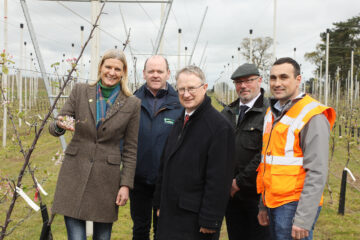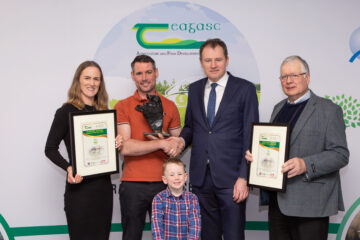Teagasc and South East Technological University (SETU), signed off on an exciting new strategic collaboration this week to create a national brewing and distilling innovation hub in Ireland.
Building on existing expertise, the two organisations will work closely together, through the new National Centre for Brewing and Distilling (NCBD) based in Oak Park in Carlow, on a range of initiatives including enhanced industry engagement, collaborative research, education, training and community engagement. It is anticipated that the partnership will create significant and coordinated efforts to support the continued sustainable growth of the malting, brewing and distilling sector in Ireland with targeted ‘through-to-impact’ research and industry supports and will grow educational opportunities and interdisciplinary research activity in this sector.
The NCBD will be a domestic centre of excellence for brewing and distilling with facilities and staff for the development and protection of these industries.
Currently in the first phase of development, the focus is on the operation of facilities for testing raw materials for malting and the production of bespoke batches of specialised malts for the craft beer sector or for test batches for the larger distilling companies.
Plans for the second phase are underway, which includes securing additional funds for the requisite equipment to support a full suite of facilities to support pilot scale brewing and distillation research, as required by industry. This will enable the industry to create opportunities to address their current challenges, train and upskill their staff, while also allowing the adaption of technology to enhance consumer demands, competitiveness and sustainability. In addition to targeted research projects, funded via public/commercial funds, the ambition of the NCBD is to support the education, training, research and innovation within the drinks industry encompassing all stages and stakeholders from education, agronomy, production to finished product.
According to Lisa Ryan, NCBD manager, “this collaboration makes perfect sense since both SETU and the National Centre for Brewing and Distilling (NCBD) at Teagasc have a shared goal of enhancing and developing the next generation of Maltster’s, Brewers and Distillers to support these industries who have created such exciting career opportunities in Ireland. The NCBD; SETU partnership will support hands on training through the NCBD giving the graduates a distinct advantage when entering the marketplace.”
SETU established the first honours degree programme in Brewing and Distilling on the island of Ireland in 2016. It is an industry facing programme combining science, engineering, business and marketing as well as research, innovation and entrepreneurship.
The degree is one of only four programmes in the world to have achieved professional recognition from the Institute of Brewing and Distilling (IBD), and lecturers and researchers work closely with industry to ensure that graduates directly meet the requirements of their future employers in the Brewing and Distilling industries, and are also in a position to enter a research career, undertake further studies or start up their own venture.
Through a joint Institute in partnership with Henan University in China, over 100 students are also currently enrolled on the programme and SETU also hosts an increasing number of researchers in its Alcohol Yield Analysis laboratories. The degree is one of a suite of related SETU programmes in Food Science, Agriculture, Farm Management, Tourism, Agribusiness, Culinary Arts and Horticulture.
Speaking at the event this week Dr. David Ryan of SETU said that, “this collaboration is a game changer for the expanding Malting, Brewing and Distilling sector in Ireland. As well as formalising the existing relationship with Teagasc and the NCBD, it strategically links with SETU strengths in supporting the agri-sector and indigenous food industries.”
Source: Teagasc



